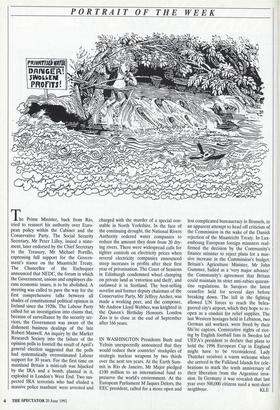PORTRAIT OF THE WEEK
The Prime Minister, back from Rio, tried to reassert his authority over Euro- pean policy within the Cabinet and the Conservative Party. The Social Security Secretary, Mr Peter Lilley, issued a state- ment, later endorsed by the Chief Secretary to the Treasury, Mr Michael Portillo, expressing full support for the Govern- ment's stance on the Maastricht Treaty. The Chancellor of the Exchequer announced that NEDC, the forum in which the Government, unions and employers dis- cuss economic issues, is to be abolished. A meeting was called to pave the way for the first comprehensive talks between all shades of constitutional political opinion in Ireland since the 1920s. The Labour Party called for an investigation into claims that, because of surveillance by the security ser- vices, the Government was aware of the dishonest business dealings of the late Robert Maxwell. An inquiry by the Market Research Society into the failure of the opinion polls to foretell the result of April's general election suggested that the polls had systematically overestimated Labour support for 30 years. For the first time on mainland Britain a mini-cab was hijacked by the IRA and a bomb, planted in it, exploded in London's West End. Two sus- pected IRA terrorists who had eluded a massive police manhunt were arrested and
charged with the murder of a special con- stable in North Yorkshire. In the face of the continuing drought, the National Rivers Authority ordered water companies to reduce the amount they draw from 20 dry- ing rivers. There were widespread calls for tighter controls on electricity prices when several electricity companies announced steep increases in profits after their first year of privatisation. The Court of Sessions in Edinburgh condemned wheel clamping on private land as 'extortion and theft', and outlawed it in Scotland. The best-selling novelist and former deputy chairman of the Conservative Party, Mr Jeffrey Archer, was made a working peer, and the composer, Mr Andrew Lloyd Webber, was knighted in the Queen's Birthday Honours. London Zoo is to close at the end of September after 166 years.
IN WASHINGTON Presidents Bush and Yeltsin unexpectedly announced that they would reduce their countries' stockpiles of strategic nuclear weapons by two thirds over the next ten years. At the Earth Sum- mit in Rio de Janeiro, Mr Major pledged £100 million to an international fund to preserve the world's environment. At the European Parliament M Jaques Delors, the EEC president, called for a more open and
less complicated bureaucracy in Brussels, in an apparent attempt to head off criticism of the Commission in the wake of the Danish rejection of the Maastricht Treaty. In Lux- embourg European foreign ministers reaf- firmed the decision by the Community's finance minister to reject plans for a mas- sive increase in the Commission's budget. Britain's Agriculture Minister, Mr John Gummer, hailed as a 'very major advance' the Community's agreement that Britain could maintain its strict anti-rabies quaran- tine regulations. In Sarajevo the latest ceasefire held for several days before breaking down. The lull in the fighting allowed UN forces to reach the belea- guered city's airport, which they hope to re- open as a conduit for relief supplies. The last Western hostages held in Lebanon, two German aid workers. were freed by their Shi'ite captors. Consecutive nights of riot- ing by English football fans in Sweden led UEFA's president to declare that plans to hold the 1996 European Cup in England might have to be reconsidered. Lady Thatcher received a warm welcome when she arrived in the Falkland Islands for cele- brations to mark the tenth anniversary of their liberation from the Argentine inva- sion. In Germany it was revealed that last year over 500,000 citizens sued a next-door


























































 Previous page
Previous page